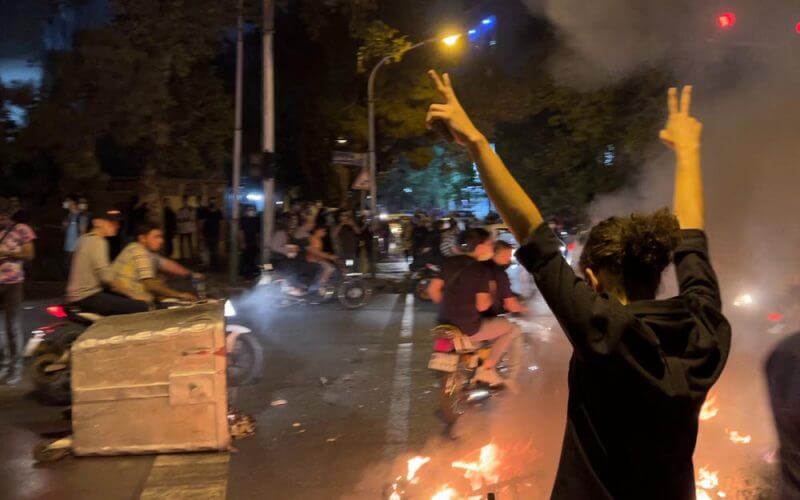Amidst the ongoing protests in Iran entering their fifth week, new reports show that young Iranian activists have begun forming a new protest organization to represent opposition against the regime and continuing to call for nationwide demonstrations. This latest development comes as the Islamic regime, under the orders of Supreme leader Ali Khamenei, maintains harsh policies in its crackdown against protesters, Iranian celebrities, journalists, and other anti-regime groups.
According to media reports, Tehran Youth, or in Persian Javanan-e Mahalaat-e Tehran, is mobilizing thousands of protests across Iranian cities through social media even as the regime has enhanced its Internet shutdown. In their recent statement posted on their Twitter page, Tehran Youth called on ordinary Iranians in the country's capital, Tehran, and other cities to gather on Saturday in areas where the regime's forces are "not present" and chant anti-regime slogans like "Down with the Dictator" and "Death to Khamenei."
Reports on the ground in Iran indicate that the regime's security forces are continuously present in the nation's capital, streets, towns, and squares, preventing people from gathering to protest and not letting pedestrians stop for any short time. Videos and photographs from eyewitnesses in Iran have shown security forces riding on motorcycles with heavy weaponry on the streets, shooting live rounds against protesters and college students marching against the regime. While some of the protesters have fought back against security forces, the government has deployed members of the Islamic Revolutionary Guards (IRGC) and its paramilitary force, the Basij police, to aid security forces and their brutal crackdowns.
However, the protesters continue to mobilize despite the additional forces and brutality, which is proving to become a challenge for the regime. The new young Iranian activist group stressed the need for a "neighborhood-centered" presence for protests to minimize harm and casualty they might face against security forces and regime supporters. In response to the ongoing internet curfew in Iran and total blackouts, the group's statement indicated that the best "anti-blockage tool" includes having a presence on the streets.
Experts familiar with the ongoing protests in Iran say that the movement to overthrow the Islamic regime lies heavily on the younger generation of Iranians tired of living under an authoritarian state that quashes their liberty and freedom. While the protests do not have a central figure leading Iranians against the regime, the latest development by younger Iranians to form an official organization to lead mass demonstrations indicates that protesters are serious about enacting regime change. Observers note that the younger generation of Iranians today is carrying both the burden of the protests and the brunt of violence while not giving up their cause against the mullahs.
For the past month, regime officials like Supreme leader Khamenei, Iranian President Ebrahim Raisi, and other hardline members of the Iranian government have come out in full force to condemn protesters, accusing them of working for "foreign powers” like Israel and the United States. In speeches to the Iranian public and the security forces, Khamenei and members of the IRGC have called on supporters of the regime to help security forces crackdown on protesters, claiming that the protesters represent a small "minority" in the country. While Khamenei has only made one address about the protests, the Supreme Leader of Iran continues to blame Western and Israeli intelligence services, accusing them of financing the protests and attempting to overthrow the Islamic Republic.
Authorities in Iran continue to enhance strict censorship guidelines for media, calling on state-run outlets to print articles that support the regime and paint protests as "evil." With demonstrations entering their fifth week, experts fear that Iran will call its proxies in the Middle East and elsewhere to help security forces crackdown against citizens on the streets, neighborhoods, and universities.
In response to the crackdowns in Iran, Western celebrities, singers, dancers, writers, human rights activists, politicians, and ordinary individuals have called on the international community to support the people of Iran and sanction the Ayatollahs, the IRGC, and family members of regime officials. According to Iranian experts, while the sanctions and measures enacted by powerful western nations like the U.S. Canada, the European Union, and others are a significant step in holding the regime accountable for their actions, more must be done to aid the protesters.









